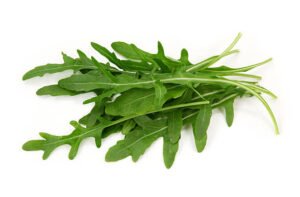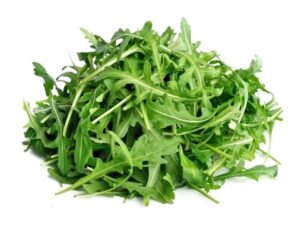Arugula, also known as rocket or roquette, is a leafy green vegetable that belongs to the Brassicaceae family. Widely consumed around the world, arugula is not only appreciated for its distinct peppery flavor but also for its numerous health benefits. This article explores the scientific evidence supporting the positive impact of arugula consumption on human health.
Anti-Inflammatory Properties
 Arugula contains phytochemicals, such as glucosinolates and polyphenols, which have been studied for their anti-inflammatory effects. Chronic inflammation is associated with numerous health issues, including heart disease, diabetes, and certain cancers. Research suggests that regular consumption of arugula may help reduce inflammation and mitigate the risk of chronic diseases.
Arugula contains phytochemicals, such as glucosinolates and polyphenols, which have been studied for their anti-inflammatory effects. Chronic inflammation is associated with numerous health issues, including heart disease, diabetes, and certain cancers. Research suggests that regular consumption of arugula may help reduce inflammation and mitigate the risk of chronic diseases.
Moreover, arugula stands out for its unique combination of antioxidants, notably high levels of vitamin K and beta-carotene. These antioxidants contribute to the suppression of pro-inflammatory markers, further enhancing arugula’s anti-inflammatory potential.
Additionally, arugula contains chlorophyll, a green pigment with known anti-inflammatory and wound-healing properties, adding an extra layer of complexity to its health-promoting attributes.
Cancer Prevention
The presence of glucosinolates in arugula is of particular interest due to their potential anti-cancer properties. Studies have indicated that these compounds may help inhibit the growth of cancer cells and reduce the risk of certain cancers, such as colorectal and lung cancer. However, more research is needed to fully understand the mechanisms behind these potential protective effects.
Arugula’s unique combination of phytochemicals, including sulforaphane, indole-3-carbinol, and quercetin, contributes to its exceptional anti-cancer attributes. Sulforaphane, in particular, has been linked to the activation of detoxification enzymes and the suppression of tumor growth. Indole-3-carbinol exhibits anti-inflammatory effects, while quercetin, a powerful antioxidant, may help neutralize free radicals that contribute to cancer development.
Heart Health
 Arugula’s high nitrate content has been linked to cardiovascular health benefits. Nitrates are converted into nitric oxide in the body, which helps dilate blood vessels, leading to improved blood flow and lower blood pressure. By promoting cardiovascular health, arugula may contribute to the prevention of heart diseases.
Arugula’s high nitrate content has been linked to cardiovascular health benefits. Nitrates are converted into nitric oxide in the body, which helps dilate blood vessels, leading to improved blood flow and lower blood pressure. By promoting cardiovascular health, arugula may contribute to the prevention of heart diseases.
Furthermore, arugula stands out among leafy greens for its optimal balance of potassium and calcium, essential minerals that play a key role in maintaining heart health. Potassium helps regulate blood pressure by counteracting the effects of sodium, while calcium supports proper heart muscle function.
In addition, the rich antioxidant profile of arugula, including vitamins A and C, provides further protection against oxidative stress and inflammation, contributing to an overall reduction in cardiovascular risk factors.
Weight Management
As a low-calorie and nutrient-dense food, arugula can be a valuable addition to a weight-conscious diet. Its fiber content promotes a feeling of fullness, which may help control appetite and contribute to weight management. Additionally, the vitamins and minerals in arugula support overall health, facilitating a balanced and sustainable approach to weight control.
Its high water content contributes to hydration, assisting in metabolism and promoting a sense of satiety without adding excess calories. This dual-action—hydration and satiation—makes arugula a standout choice for those seeking an effective and refreshing addition to their weight loss or maintenance journey.
In addition, arugula is exceptionally low in fat and carbohydrates, making it an ideal component for those on low-carb or low-fat diets. The combination of its minimal calorie load and nutrient richness makes arugula a strategic ally in crafting meals that not only support weight goals but also prioritize nutritional density.
Improved Digestion
 Arugula contains fiber, which is essential for digestive health. Adequate fiber intake promotes regular bowel movements and helps prevent constipation. The fiber in arugula also supports a healthy gut microbiome, contributing to overall digestive well-being.
Arugula contains fiber, which is essential for digestive health. Adequate fiber intake promotes regular bowel movements and helps prevent constipation. The fiber in arugula also supports a healthy gut microbiome, contributing to overall digestive well-being.
Moreover, the unique composition of arugula’s fiber includes indigestible carbohydrates that reach the colon undigested, serving as prebiotics. These prebiotics act as a nourishing source for beneficial gut bacteria, fostering a balanced microbiome. This not only aids in digestion but also contributes to the production of short-chain fatty acids, which play a role in maintaining the health of the intestinal lining and further enhancing digestive resilience.
Bone Health
Arugula is a noteworthy source of vitamin K, a crucial nutrient for bone health. Vitamin K is involved in the regulation of calcium, a mineral essential for bone mineralization and strength. Adequate vitamin K intake has been associated with a reduced risk of fractures and improved bone density. Incorporating arugula into your diet can contribute to the maintenance of strong and healthy bones, especially as you age.
Furthermore, arugula stands out due to its unique combination of vitamins and minerals that complement the bone-strengthening effects of vitamin K. Rich in calcium, magnesium, and potassium, arugula provides a trifecta of essential nutrients crucial for maintaining bone integrity. The synergy of these elements not only supports bone mineralization but also aids in preventing age-related bone diseases, making arugula a valuable addition to a bone-healthy diet.
Eye Health
 The presence of carotenoids, such as lutein and zeaxanthin, in arugula makes it beneficial for eye health. These compounds are known to protect the eyes from age-related macular degeneration and other vision-related issues. Lutein and zeaxanthin act as antioxidants, helping to neutralize harmful free radicals in the eyes and supporting overall eye function.
The presence of carotenoids, such as lutein and zeaxanthin, in arugula makes it beneficial for eye health. These compounds are known to protect the eyes from age-related macular degeneration and other vision-related issues. Lutein and zeaxanthin act as antioxidants, helping to neutralize harmful free radicals in the eyes and supporting overall eye function.
Arugula stands out for its high concentration of chlorophyll, a green pigment that, when consumed, has been linked to reduced oxidative stress in the eyes. This may play a crucial role in preventing cellular damage and promoting long-term eye health.
Moreover, the abundance of vitamins A and C in arugula complements the role of carotenoids in supporting vision. Vitamin A is essential for the proper functioning of the retina and plays a vital role in low-light and color vision. Meanwhile, vitamin C, as a powerful antioxidant, contributes to the health of blood vessels in the eyes and the prevention of conditions such as cataracts.
Blood Sugar Regulation
Research suggests that arugula may play a role in regulating blood sugar levels. The high fiber content in arugula can slow down the absorption of sugar, preventing rapid spikes in blood glucose. This effect is particularly beneficial for individuals with diabetes or those looking to manage their blood sugar levels effectively.
Furthermore, arugula’s unique combination of phytochemicals, such as glucosinolates, may contribute to its blood sugar-regulating properties. These bioactive compounds have been studied for their potential to enhance insulin sensitivity and improve glucose metabolism.
Detoxification Support
Arugula contains compounds that support the body’s natural detoxification processes. The glucosinolates found in arugula are known to aid in the detoxification of harmful substances and promote the elimination of toxins from the body. Including arugula in your diet may contribute to overall detoxification and support the health of organs involved in the detox process, such as the liver.
The presence of chlorophyll in arugula has been linked to enhanced liver function, promoting the removal of toxins and supporting the production of enzymes crucial for metabolic processes. Moreover, arugula’s high water content contributes to kidney function, facilitating the elimination of waste products and further supporting the body’s natural detox mechanisms.
Skin Health
 The combination of vitamins A and C in arugula contributes to skin health. Vitamin A is essential for skin regeneration, while vitamin C plays a key role in collagen production, which is crucial for maintaining skin elasticity and preventing signs of aging. Including arugula in your diet can support a healthy complexion and contribute to the overall well-being of your skin.
The combination of vitamins A and C in arugula contributes to skin health. Vitamin A is essential for skin regeneration, while vitamin C plays a key role in collagen production, which is crucial for maintaining skin elasticity and preventing signs of aging. Including arugula in your diet can support a healthy complexion and contribute to the overall well-being of your skin.
Moreover, arugula’s unique composition extends its benefits to the skin through antioxidants, such as carotenoids and polyphenols. These powerful compounds combat oxidative stress, protecting the skin from free radicals that contribute to premature aging. Arugula’s ability to neutralize these harmful molecules adds an extra layer of defense, promoting a radiant and youthful complexion.
Additionally, the high water content in arugula contributes to skin hydration, aiding in moisture retention and promoting a healthy glow. This natural hydration, combined with the vitamins and antioxidants present, makes arugula a standout choice for those seeking not only skin health but also a refreshing approach to overall skincare.
Cognitive Function
The presence of folate in arugula is associated with cognitive function and mental health. Folate plays a role in the production of neurotransmitters, including serotonin and dopamine, which are essential for mood regulation. Adequate folate intake is linked to a lower risk of cognitive decline, making arugula a valuable addition to a brain-healthy diet.
Furthermore, arugula stands out for its additional cognitive benefits due to its rich content of antioxidants, particularly vitamin K and carotenoids. These compounds have been shown to exert protective effects on brain cells, reducing oxidative stress and inflammation.
Immune System Support
Arugula’s rich content of vitamins and antioxidants contributes to a robust immune system. Vitamin C, in particular, is known for its immune-boosting properties. Regular consumption of arugula can help strengthen the body’s defenses against infections and illnesses, supporting overall immune system function.
Furthermore, arugula stands out for its unique combination of phytochemicals, such as glucosinolates and flavonoids, which exhibit potent anti-inflammatory and antimicrobial properties. These compounds not only aid in fortifying the immune system but also contribute to reducing inflammation within the body, creating an environment less conducive to the proliferation of harmful pathogens.
Additionally, the high concentration of beta-carotene in arugula enhances its immune-boosting prowess. Beta-carotene is a precursor to vitamin A, a vital nutrient known for its role in maintaining the integrity of the mucosal surfaces, including those in the respiratory and gastrointestinal tracts.
Anti-Aging Effects
The antioxidants present in arugula, including vitamin A and C, help combat oxidative stress and free radicals in the body. These harmful molecules contribute to the aging process and various chronic diseases. By neutralizing free radicals, arugula may contribute to a reduction in the visible signs of aging, promoting healthier skin and overall longevity.
In addition to its antioxidant prowess, arugula stands out for its unique blend of phytochemicals, such as glucosinolates and chlorophyll, which contribute to its anti-aging properties. These compounds work synergistically to support the body’s natural detoxification processes, aiding in the elimination of toxins that may accelerate aging. Arugula’s detoxifying abilities not only promote a youthful complexion but also contribute to the overall well-being of vital organs, further enhancing its role in the fight against premature aging.
Furthermore, arugula is a rich source of dietary nitrates, which play a dual role in supporting cardiovascular health and skin vitality. Nitrates, converted into nitric oxide in the body, help improve blood flow, delivering essential nutrients and oxygen to the skin cells. This enhanced circulation promotes a healthy, radiant complexion and assists in reducing the appearance of fine lines and wrinkles.
Alkalizing Properties
Arugula is considered an alkaline-forming food, which means it helps maintain the body’s optimal pH balance. An alkaline environment in the body is believed to have various health benefits, including improved energy levels, better digestion, and a reduced risk of chronic diseases. Incorporating arugula into your diet can contribute to a more alkaline state in the body.
In addition to its alkalizing properties, arugula stands out for its unique combination of minerals, such as calcium and magnesium, which play a pivotal role in supporting the body’s alkalinity. These minerals not only contribute to pH balance but also participate in essential physiological functions, promoting overall well-being.
Furthermore, arugula’s alkalizing effects extend to its rich content of chlorophyll, a green pigment with potent detoxifying properties. Chlorophyll helps cleanse the body of acidic waste products and toxins, further enhancing the alkaline environment.
Anti-Microbial Effects
Studies suggest that arugula possesses antimicrobial properties, potentially helping to combat certain harmful microorganisms. The presence of phytochemicals and essential oils in arugula may contribute to its ability to inhibit the growth of bacteria and fungi. While more research is needed in this area, these properties highlight arugula’s potential role in supporting overall microbial balance in the body.
Furthermore, the unique combination of glucosinolates and sulfur-containing compounds in arugula sets it apart, showcasing distinctive attributes that contribute to its antimicrobial prowess. These compounds are thought to interfere with the microbial life cycle, exhibiting a targeted approach that may offer nuanced benefits in maintaining a healthy microbial environment within the body.
Environmental Sustainability
Beyond its health benefits, arugula cultivation is often considered environmentally sustainable. It tends to require fewer resources, such as water and fertilizer, compared to other leafy greens. Choosing arugula as part of a balanced diet may align with environmentally conscious food choices, contributing to sustainable agriculture practices.
Versatile Culinary Uses
Apart from its health advantages, arugula adds a burst of flavor and texture to a variety of dishes. Its peppery taste makes it a popular addition to salads, sandwiches, pizzas, and pasta dishes. The versatility of arugula in the kitchen makes it an accessible and enjoyable way to reap its health benefits while enhancing the taste of your favorite meals.
Nutrient Composition of Arugula (Per 100 grams)
- Calories: 25 kcal
- Water: 91.7 g
- Protein: 2.6 g
- Carbohydrates: 3.7 g
- Dietary Fiber: 1.6 g
- Sugars: 2.1 g
- Fat: 0.7 g
- Saturated Fat: 0.1 g
- Monounsaturated Fat: 0.1 g
- Polyunsaturated Fat: 0.3 g
- Omega-3 Fatty Acids: 138 mg
- Omega-6 Fatty Acids: 168 mg
- Vitamins:
- Vitamin A (as Beta-Carotene): 4743 IU (95% DV)
- Vitamin C: 15 mg (25% DV)
- Vitamin K: 109 µg (136% DV)
- Folate: 97 µg (24% DV)
- Vitamin E: 0.4 mg (2% DV)
- Vitamin B6: 0.1 mg (5% DV)
- Niacin: 0.3 mg (2% DV)
- Riboflavin: 0.1 mg (4% DV)
- Thiamin: 0.1 mg (4% DV)
- Pantothenic Acid: 0.1 mg (1% DV)
- Minerals:
- Calcium: 160 mg (16% DV)
- Iron: 1.5 mg (8% DV)
- Magnesium: 47 mg (12% DV)
- Phosphorus: 52 mg (5% DV)
- Potassium: 369 mg (11% DV)
- Sodium: 27 mg (1% DV)
- Zinc: 0.5 mg (4% DV)
- Manganese: 0.3 mg (15% DV)
- Copper: 0.1 mg (6% DV)
- Phytochemicals:
- Glucosinolates: Variable, depending on the specific variety
- Carotenoids (Lutein and Zeaxanthin): Variable, contributing to eye health
- Polyphenols: Variable, contributing to antioxidant properties
- Essential Oils: Trace amounts, contributing to flavor and potential antimicrobial effects
Note: The values provided are approximate and may vary based on factors such as cultivation methods and specific arugula varieties. It’s always advisable to refer to specific packaging or consult with a nutritionist for precise information based on the product you’re using.
Conclusion
Incorporating arugula into your diet can offer a range of health benefits supported by scientific research. From its anti-inflammatory and anti-cancer properties to its positive impact on heart health, weight management, and digestion, arugula stands out as a nutritious addition to a well-balanced diet. While enjoying the unique peppery taste, individuals can also appreciate the potential health-enhancing properties of this versatile leafy green. As with any dietary change, it’s advisable to consult with a healthcare professional or nutritionist to ensure that arugula consumption aligns with individual health goals and needs.
 Embark on a culinary journey with our “Easy Arugula Salad” recipe, a delightful creation that balances simplicity and flavor in every bite. This refreshing salad not only captures the essence of arugula’s peppery notes but also combines it with a medley of vibrant ingredients to create a dish that’s both light and satisfying. Whether you’re a seasoned chef or a novice in the kitchen, this recipe is designed for simplicity without compromising on taste.
Embark on a culinary journey with our “Easy Arugula Salad” recipe, a delightful creation that balances simplicity and flavor in every bite. This refreshing salad not only captures the essence of arugula’s peppery notes but also combines it with a medley of vibrant ingredients to create a dish that’s both light and satisfying. Whether you’re a seasoned chef or a novice in the kitchen, this recipe is designed for simplicity without compromising on taste.
Contraindications for Arugula Consumption
While arugula is generally considered safe and nutritious for most individuals, there are specific contraindications and considerations that certain people should be aware of:
Blood Clotting Disorders:
- Arugula is high in vitamin K, which plays a crucial role in blood clotting. Individuals taking blood-thinning medications, such as warfarin, should monitor their vitamin K intake and consult with their healthcare provider to maintain consistent medication efficacy.
Kidney Issues:
- Arugula contains oxalates, naturally occurring compounds that can contribute to the formation of kidney stones. Individuals with a history of kidney stones or kidney issues may want to moderate their consumption of high-oxalate foods, including arugula.
Thyroid Disorders:
- Arugula, like other cruciferous vegetables, contains compounds known as goitrogens, which may interfere with thyroid function. While the goitrogenic effects of arugula are generally minimal, individuals with thyroid disorders may consider moderating their intake and consulting with their healthcare provider.
Allergies:
- Some individuals may be allergic to arugula or other members of the Brassicaceae family, which includes broccoli and mustard. Allergic reactions can range from mild skin irritation to more severe symptoms. Anyone with known food allergies should exercise caution and seek medical advice if uncertain.
Gastrointestinal Sensitivity:
- Arugula’s peppery flavor may be too intense for individuals with sensitive digestive systems. In some cases, the high fiber content in arugula could lead to gas or bloating. It’s advisable for those with gastrointestinal sensitivities to monitor their body’s response to arugula consumption.
Pregnancy and Breastfeeding:
- Pregnant or breastfeeding individuals should be cautious with arugula due to its high vitamin K content. While vitamin K is essential for blood clotting, excessive amounts may interfere with certain medications or medical conditions. Consultation with a healthcare provider is recommended.
It’s important for individuals with specific health concerns or conditions to consult with their healthcare provider or a registered dietitian before making significant changes to their diet, including the introduction of new foods like arugula. Overall, moderation and balance are key, and individual responses to arugula consumption may vary.
Fascinating Facts About Arugula
- Wild Side Origins:
Arugula has wild ancestors that thrived in the Mediterranean and Central Asia. Its untamed origins give it a certain rugged charm, making it a leafy green with a wild side.
- Banned in Ancient Rome:
Despite its popularity among the ancient Romans, arugula faced a temporary ban. The Roman emperor Domitian disapproved of its association with aphrodisiac qualities and briefly prohibited its cultivation.
- Aromatic Adventure:
Arugula is not just a delight for the taste buds; it also boasts a distinct aroma. Its fragrance, often described as nutty and peppery, adds an aromatic dimension to the overall sensory experience.
- Edible Flowers:
Yes, arugula produces edible flowers! These delicate blooms, with a subtle peppery flavor, can be a unique addition to salads or used as a garnish, adding a touch of floral elegance.
- Medieval Medicine Marvel:
During the Middle Ages, arugula was not only savored in the kitchen but also considered a medicinal marvel. It was believed to have healing properties, and its consumption was thought to promote good digestion.
- Symbol of Aphrodite:
Arugula’s association with love and desire goes beyond ancient Rome. In Greek mythology, it was considered a symbol of Aphrodite, the goddess of love, making it a leafy green with romantic connotations.
- Biennial Bloomer:
Arugula is typically grown as an annual, but it has a biennial nature. In its second year, arugula can produce flowers and seeds. This adds a surprising twist to its life cycle, highlighting its adaptability.
- Alternative Name Galore:
Arugula goes by an array of names around the world, each reflecting its cultural significance. From “rucola” in Italy to “rocket” in the United Kingdom, its various aliases add an international flair to its identity.
- Heralding Spring:
In some cultures, arugula is associated with the arrival of spring. Its early-season resilience and ability to thrive in cooler temperatures make it a herald of the changing seasons.
- Roots in Astrology:
Arugula’s ties to mysticism extend to astrology. In ancient times, it was believed that arugula had connections to the planet Mars, adding a cosmic touch to its culinary and historical narrative.
- Interstellar Connection:
Believe it or not, arugula has a connection to outer space. In 2015, astronauts aboard the International Space Station (ISS) cultivated arugula as part of a Veggie plant growth experiment. Arugula’s earthly charm reached celestial heights!
- Zodiac Alignment:
Some astrological enthusiasts believe that arugula is aligned with the zodiac sign Aries. While not a mainstream belief, the connection adds a touch of cosmic curiosity to this leafy green.
- Ephemeral Blooms:
Arugula’s flowers, while edible, are a fleeting phenomenon. The blooms appear briefly, offering a delicate burst of flavor and aesthetics before making way for the next stage in arugula’s life cycle.
- Anti-Insect Arsenal:
Arugula is a natural insect repellent. Its compounds act as a deterrent to certain pests, showcasing its self-defense mechanism against unwanted nibblers.
- Aphrodisiac Allegations:
The association of arugula with love is not restricted to ancient times. Some modern herbalists suggest that arugula has aphrodisiac qualities, sparking romantic notions around this unsuspecting green.
- Historical Culinary Ink:
Arugula was used as a culinary ink in ancient Rome. Its juice was extracted and used as a natural dye to add color and flavor to various dishes, creating a vibrant and flavorful ancient culinary palette.
- Musical Affinity:
Arugula’s name is often linked to the Italian word “ruchetta,” which means “little roquette.” This linguistic connection adds a lyrical charm to arugula’s identity, as if it were a petite note in the symphony of greens.
- Secret Seed Shapes:
Arugula seeds, when viewed up close, resemble tiny sculptures. Their intricate shapes and patterns add an artistic touch to the often-overlooked aspect of arugula propagation.
- Culinary Crossroads Redux:
Arugula continues to find itself at the culinary crossroads. It has been a staple in traditional Mediterranean dishes for centuries, and its recent resurgence in popularity aligns with contemporary food trends, proving its timeless appeal.
- Mystical Herb Status:
Arugula was once considered a mystical herb with protective qualities. In folklore, it was believed that carrying arugula could ward off evil spirits and bring good fortune—an unexpected twist in its historical narrative.
To explore more plants, please visit our page about plants
Renna M, Gonnella M, et al. Nutritional compounds regulating white adipose tissue development and activity: A focus on phytochemicals. Frontiers in Physiology. 2015; 6: 1-14.
Herr I, Büchler MW. Dietary constituents of broccoli and other cruciferous vegetables: Implications for prevention and therapy of cancer. Cancer Treatment Reviews. 2010; 36(5): 377-383.
Di Gioia F, Tzortzakis N, Rouphael Y, et al. Nitrates in Leafy Greens: Relationship between Salinity and Nitrate Accumulation in Rocket Leaves (Eruca sativa L.) under Controlled Environment. Agronomy. 2020; 10(2): 268.
Clifford T, Howatson G, West DJ, Stevenson EJ. The potential benefits of red beetroot supplementation in health and disease. Nutrients. 2015; 7(4): 2801-2822.
Ames BN, Cathcart R, Schwiers E, Hochstein P. Uric acid provides an antioxidant defense in humans against oxidant- and radical-caused aging and cancer: a hypothesis. Proceedings of the National Academy of Sciences of the United States of America. 1981; 78(11): 6858–6862.
Higdon JV, Delage B, Williams DE, Dashwood RH. Cruciferous vegetables and human cancer risk: epidemiologic evidence and mechanistic basis. Pharmacological Research. 2007; 55(3): 224-236.
Ferruzzi MG, Blakeslee J. Digestive and nutritional properties of rocket salad (Eruca sativa Mill.) leaves. Proceedings of the Nutrition Society. 2007; 66(4): 520-527.
Bondonno NP, Croft KD, et al. Nitrate, a novel nutritional ergogenic aid to reduce cardiovascular stress? Current Hypertension Reports. 2015; 17(12): 96.
Esteve MJ, Frígola A. Folate content in home-cooked foods: contribution of the raw food in the diet. European Journal of Clinical Nutrition. 1997; 51(9): 578-584.
Raiola A, Errico A, Petruk G, et al. Bioactive compounds in Brassicaceae vegetables with a role in the prevention of chronic diseases. Molecules. 2017; 22(1): 15
See the benefits for: Hair , Skin , Heart , Bones , Liver , Brain , Eyes , Kidney , Lungs , Stomach , Gallbladder , Blood vessels, Immune system
Disclaimer:
The information provided in this article is for educational purposes only and does not replace professional medical advice. Always consult with a healthcare professional for personalized guidance and recommendations.
